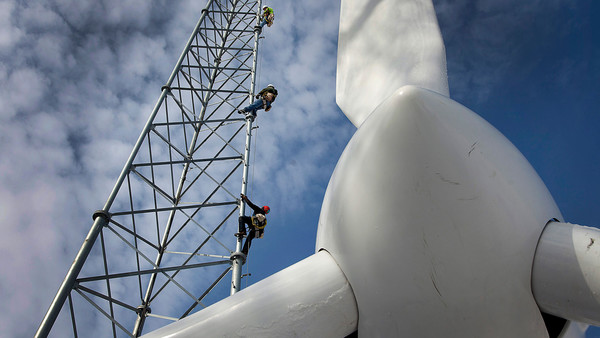
Concerns over high energy costs in Europe are undermining support for the binding renewable targets that have been seen as one of the EU’s most visible environmental achievements.
European commissioners are considering scrapping the targets for 2030 in a move that would please big utility companies but infuriate environmental groups. The energy and climate targets, which the commission is due to propose on January 22, are stoking acrimony among countries and between commissioners and have become a subject of intense lobbying.
A target for how much power European countries should source from renewables is one of the most bitterly debated parts of next week’s package. The UK, which is increasing its use of nuclear power, opposes a binding goal. Germany, which is shutting down its reactors, is the most powerful voice in favour of an obligatory target.
A proposed compromise, at the heart of discussions over the 2030 package, envisages that a renewables target, of up to 27 per cent, would be non-binding. However, people close to the talks added that a non-binding renewables target would need to be given credibility by stronger rules to make networks more efficient, including binding objectives related to energy infrastructure, smart grids and better sharing of power across borders.
This compromise for 2030, if accepted in the face of German opposition, would represent a significant change from the EU’s 2020 targets, which included binding goals that EU states should cut overall greenhouse gas emissions by 20 per cent from 1990 levels and derive 20 per cent of their power from renewables. Measures to improve energy efficiency by 20 per cent were only aspirational. For 2030, the tougher and quantifiable action would be focused on more technical aspects of upgrading infrastructure.
“It’s a bottom-up approach that is being considered now,” said one person involved.
Discussions have been influenced by concerns that the generous subsidies supporting renewable energy in the EU are driving up energy costs for European industry and undermining its competitiveness, especially compared with the US.
Europe has looked on in envy as the US shale gas boom has boosted gas production, driven down gas prices and triggered a manufacturing renaissance. Gas prices for industry fell by 66 per cent in the US between 2005 and 2012, while they rose 35 per cent in Europe over the same period, according to the commission.
Worried by the widening competitiveness gap, European utilities last year called for a complete rethink of European energy policy, demanding big reductions in renewables subsidies. The companies have lobbied against a 2030 renewables target, arguing it gives governments less flexibility over how they should meet overarching emission reduction targets.
The UK argues that a strong binding target focused on emissions rather than renewables is enough to create a greener energy mix. Along with France, Italy, Germany, the Netherlands and Spain, it supports a 2030 target of cutting emissions by at least 40 per cent from 1990 levels. Some eastern European nations worry that is too high, as do EU commissioners with more industrial portfolios, who favour a 35 per cent cut.
Utilities such as Eon have campaigned against the renewables target while energy companies such as Alstom and Vestas, which build renewables infrastructure, are seeking a binding target of more than 30 per cent. Greenpeace is advocating a 45 per cent renewables goal.
Critics say that a renewables goal requires subsidies for relatively expensive technologies while a surplus of carbon allowances is still encouraging power producers to burn coal. Environmental groups admit that the 2020 targets had design flaws but contest that advances in renewable technology would never have happened without a compulsory target.
After the commission makes its proposal on January 22, national leaders will decide in March whether to endorse the 2030 targets.
- CBCSD and Members Participated and Suggested on the Project for Technical Regulation on Low-carbon Pilot Community
- CBCSD and Members Participated in the APEC Cooperation Network Construction Forum of Green Supply Chain
- Calculation Method of CO2 Emissions in Petroleum and Natural Gas Exploitation Enterprises & Calculation Method of CO2 Emissions in Water Network of Chemical Enterprises
- CBCSD Attended the Workshop for Environmental Protection and Sustainable Development and Delivered Introductions
- WBCSD: Tackling the Challenge, How to Make Informed Choices on Forest Product?
- The National New-Type Urbanization Plan Released, Board Members of CBCSD Help the Sustainable Development of Cities
- Board members of CBCSD Actively Participated in the Carbon Trading and International Climate Change Process
- Two industrial Standards Compiled by CBCSD Passed Examination
- Widespread Use of the Achievements Businesses Energy Saving and Greenhouse Gas Management
- CBCSD held Chemical industry enterprise value chain (range 3) greenhouse gas emissions, accounting and reporting guidelines

